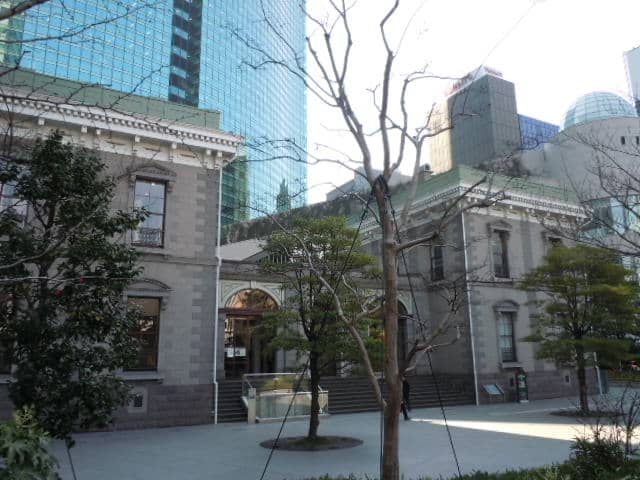
Old Shimbashi Station
Step back in time at Old Shimbashi Station, the historic starting point of Japan's railway network. Explore preserved foundations and exhibits.

Highlights
Must-see attractions

Social
From TikTok & Reddit
Best Time
Fewer crowds for a peaceful visit

Old Shimbashi Station
Best Time
Fewer crowds for a peaceful visit

Highlights
Must-see attractions
Step back in time at Old Shimbashi Station, the historic starting point of Japan's railway network. Explore preserved foundations and exhibits.
"A free, historical gem offering a glimpse into Japan's railway origins, despite limited English text."

🎯 Easy to Find
It can be a bit tricky to locate, but it's only a 2-minute walk from the new Shimbashi Station.
🚫 No Photos Inside
Remember, photography is prohibited within the museum exhibits.

Highlights
Discover the most iconic attractions and experiences

Preserved Foundations
Original Station Site
See the intact foundations of the original station, a tangible link to Japan's early railway era.

Zero Marker Point
Backside of the site
Discover the birthplace of Japan's railway network, marking the start of the Shimbashi-Yokohama line.

Railway History Exhibits
Museum Area
Explore displays on uniforms, photos, and the 150-year history of Japanese railways.
Plans like a pro.
Thinks like you
Planning Your Visit
Quick Access & Free Entry
Photo Restrictions & Stamp Collection
Best Times
Insider Tips
from TikTok, Instagram & Reddit
🎯 Easy to Find
It can be a bit tricky to locate, but it's only a 2-minute walk from the new Shimbashi Station.
🚫 No Photos Inside
Remember, photography is prohibited within the museum exhibits.
📜 Collect a Stamp
Don't forget to grab a museum stamp as a unique souvenir of your visit.
📚 History Buffs Rejoice
A must-visit for anyone interested in Japanese rail history, even with limited English displays.
Tips
from all over the internet
🎯 Easy to Find
It can be a bit tricky to locate, but it's only a 2-minute walk from the new Shimbashi Station.
🚫 No Photos Inside
Remember, photography is prohibited within the museum exhibits.
📜 Collect a Stamp
Don't forget to grab a museum stamp as a unique souvenir of your visit.
📚 History Buffs Rejoice
A must-visit for anyone interested in Japanese rail history, even with limited English displays.
What Travellers Say
Reviews Summary
Visitors appreciate Old Shimbashi Station for its historical significance as the birthplace of Japan's railway network and its free admission. The preserved foundations and zero marker point are highlights, offering a tangible connection to the past. However, some find the museum exhibits have limited English translations and photography is restricted inside.
"It is just 2 mins walk from the new shimbashi station. The foundations are still intact and preserved. Check out the exhibitions and foundation stone and head to the backside for zero marker point which is the birthplace of the Japanese railway network from shimbashi to yokohama. Dont forget to collect the museum stamp."
Kiran Baliga
"Nice museum of the old Shimbashi railways station lots of information but not in English on all displays. The staff are friendly but you cannot take pictures while inside the museum all in all a nice experience of Japanese rail history."
Paul Cash-Davis
"It’s not allowed to take photos inside the museum but it’s worth the visit if you love history and history of train stations"
Ry Pen
What People Like
What People Dislike
Frequently Asked Questions
🚇 🗺️ Getting There
Old Shimbashi Station is conveniently located just a 2-minute walk from the new Shimbashi Station. Simply follow the signs once you exit the main station.
Yes, it is very accessible. Shimbashi Station is a major hub served by multiple JR and subway lines, making it easy to reach from anywhere in Tokyo.
The closest and most convenient station is the new Shimbashi Station. The historical site is a short stroll away.
🎫 🎫 Tickets & Entry
No, entry to the Old Shimbashi Station site and its museum is free of charge.
Specific opening hours can vary, but it is generally accessible during daytime hours. It's advisable to check for any seasonal changes.
The museum area is free to enter, offering a great opportunity to learn about railway history without any cost.
📸 📸 Photography
Unfortunately, photography is not permitted inside the museum exhibits. Please respect the rules during your visit.
While indoor photography is restricted, you can capture images of the preserved foundations and the exterior of the reproduction building. The zero marker point is also a good photo spot.
🎫 🏛️ Onsite Experience
You can explore the preserved foundations of the original station, view exhibits on Japanese railway history, and see the zero marker point for the first railway line.
Some displays may have limited English translations, so it might be challenging for non-Japanese speakers to understand all the details.
It can be interesting for children who are fascinated by trains and history, though the lack of English text might limit engagement for younger visitors.
A visit typically takes about 30 minutes to an hour, depending on your interest in the exhibits and historical details.
For Different Travelers
Tailored advice for your travel style
👨👩👧 Families with Kids
Keep in mind that photography is not allowed inside the museum, which might be a point of contention for younger visitors eager to document their experience. However, the free admission and the proximity to the bustling Shimbashi Station make it an easy addition to a day of sightseeing without adding significant cost or travel time. Collecting the museum stamp can also be a fun, small activity for kids.
🏛️ History Enthusiasts
While the museum's limited English signage might require some prior knowledge or a translation app, the visual exhibits of uniforms, photographs, and artifacts provide a rich context for understanding the evolution of Japanese railways. It's a chance to appreciate the engineering and societal impact of this transformative technology.
Deep Dives
In-depth insights and expert knowledge
The Birthplace of Japanese Railways
The Zero Marker Point at the back of the site is a crucial landmark, symbolizing the beginning of the entire Japanese railway network. It's a powerful reminder of the ambition and innovation that drove the country's industrial development. While the current building is a reproduction, the preserved foundations and the historical significance of the location make it a compelling visit for history enthusiasts.
Despite some limitations with English signage, the site provides a valuable glimpse into the early days of rail travel. The exhibits, though sometimes challenging to fully comprehend without Japanese language skills, showcase historical artifacts, photographs, and information about the uniforms and operations of the time.
Navigating the Site and Exhibits
Inside the museum, you'll find displays featuring historical photographs, uniforms, and artifacts that tell the story of the railway's development. While the content is rich with historical information, a significant portion of the text is in Japanese, which might be a barrier for international visitors seeking detailed explanations. However, the visual elements and the sheer historical weight of the location can still be very impactful.
One unique aspect of the visit is the opportunity to collect a museum stamp. This is a common practice in Japanese museums and offers a small, personalized memento of your trip. Remember that photography is strictly prohibited within the museum area, so be sure to absorb the exhibits with your eyes and mind.


Social
from TikTok, Instagram & Reddit